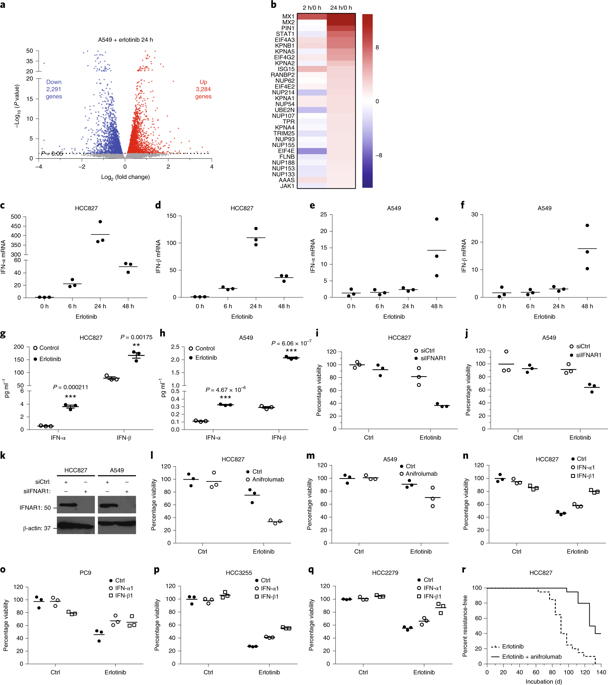Nature Cancer ( IF 23.5 ) Pub Date : 2020-04-06 , DOI: 10.1038/s43018-020-0048-0 Ke Gong 1 , Gao Guo 1 , Nishah Panchani 1 , Matthew E Bender 2 , David E Gerber 3, 4, 5 , John D Minna 3, 6, 7 , Farjana Fattah 4 , Boning Gao 6, 7 , Michael Peyton 6, 7 , Kemp Kernstine 8 , Bipasha Mukherjee 9 , Sandeep Burma 9 , Cheng-Ming Chiang 4, 6, 10 , Shanrong Zhang 11 , Adwait Amod Sathe 5 , Chao Xing 5, 12, 13 , Kathryn H Dao 14 , Dawen Zhao 15 , Esra A Akbay 2, 4 , Amyn A Habib 1, 4, 16

|
EGFR inhibition is an effective treatment in the minority of non-small cell lung cancer (NSCLC) cases harboring EGFR-activating mutations, but not in EGFR wild-type (EGFRwt) tumors. Here we demonstrate that EGFR inhibition triggers an antiviral defense pathway in NSCLC. Inhibiting mutant EGFR triggers type I interferon (IFN)-I upregulation via a RIG-I–TANK-binding kinase 1 (TBK1)–IRF3 pathway. The ubiquitin ligase TRIM32 associates with TBK1 upon EGFR inhibition and is required for K63-linked ubiquitination and TBK1 activation. Inhibiting EGFRwt upregulates IFNs via a NF-κB-dependent pathway. Inhibition of IFN signaling enhances EGFR-tyrosine kinase inhibitor (TKI) sensitivity in EGFR-mutant NSCLC and renders EGFRwt/KRAS-mutant NSCLC sensitive to EGFR inhibition in xenograft and immunocompetent mouse models. Furthermore, NSCLC tumors with decreased IFN-I expression are more responsive to EGFR-TKI treatment. We propose that IFN-I signaling is a major determinant of EGFR-TKI sensitivity in NSCLC and that a combination of EGFR-TKI plus IFN-neutralizing antibody could be useful in most patients with NSCLC.
中文翻译:

EGFR 抑制通过选择肺癌中的抗病毒信号通路来触发适应性反应
EGFR 抑制是少数携带 EGFR 激活突变的非小细胞肺癌 (NSCLC) 病例的有效治疗方法,但不适用于 EGFR 野生型 (EGFRwt) 肿瘤。在这里,我们证明 EGFR 抑制会触发 NSCLC 中的抗病毒防御途径。抑制突变型 EGFR 通过 RIG-I–TANK 结合激酶 1 (TBK1)–IRF3 途径触发 I 型干扰素 (IFN)-I 上调。泛素连接酶 TRIM32 在 EGFR 抑制时与 TBK1 结合,并且是 K63 连接的泛素化和 TBK1 激活所必需的。抑制 EGFRwt 通过 NF-κB 依赖性途径上调 IFN。在异种移植和免疫功能正常的小鼠模型中,抑制 IFN 信号传导可增强 EGFR 突变 NSCLC 中 EGFR 酪氨酸激酶抑制剂 (TKI) 的敏感性,并使 EGFRwt/KRAS 突变 NSCLC 对 EGFR 抑制敏感。此外,IFN-I表达降低的NSCLC肿瘤对EGFR-TKI治疗更敏感。我们认为 IFN-I 信号传导是 NSCLC EGFR-TKI 敏感性的主要决定因素,并且 EGFR-TKI 加 IFN 中和抗体的组合可能对大多数 NSCLC 患者有用。











































 京公网安备 11010802027423号
京公网安备 11010802027423号